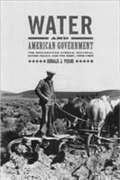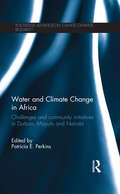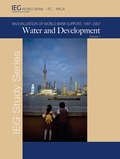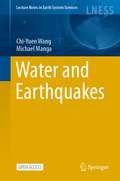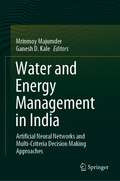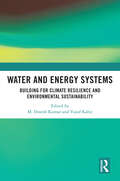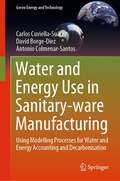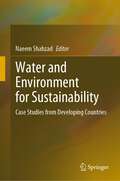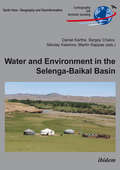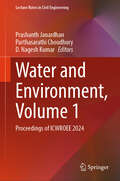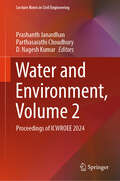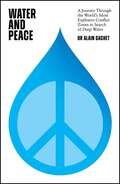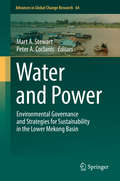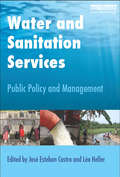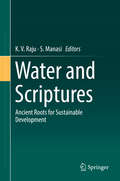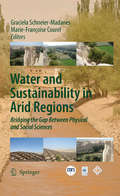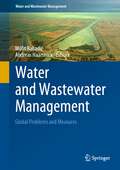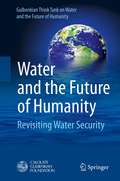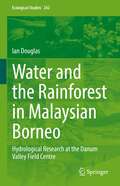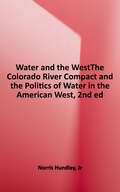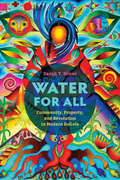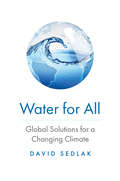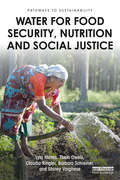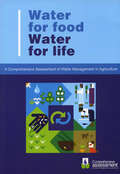- Table View
- List View
Water and American Government: The Reclamation Bureau, National Water Policy, and the West, 1902–1935
by Donald J. PisaniDonald Pisani's history of perhaps the boldest economic and social program ever undertaken in the United States--to reclaim and cultivate vast areas of previously unusable land across the country--shows in fascinating detail how ambitious government programs fall prey to the power of local interest groups and the federal system of governance itself.
Water and Climate Change in Africa: Challenges and Community Initiatives in Durban, Maputo and Nairobi (Routledge Advances in Climate Change Research)
by Patricia E. PerkinsIn the coming decades, countries around the world will face increasingly severe challenges related to global climate change. While the details vary from country to country, the impacts will be especially grave for marginalized people, whose access to food, potable water, and safe shelter may be threatened due to fluctuations in rainfall and temperature, and to extreme weather events. Because weather extremes are the main way that climate change manifests itself, water governance is a crucial aspect of climate change resilience. Following an overview of the ways climate change is affecting three cities in Africa, Water and Climate Change in Africa: Challenges and Community Initiatives in Durban, Maputo and Nairobi discusses the equity and climate justice implications, and then gives examples of ways in which a range of local community organizations are extending their current activities to address these challenges through innovative new programs and initiatives at the grassroots. This approach has implications for communities worldwide; it is a process of building on existing organizations’ aptitudes and strengths in the light of local knowledge of climate challenges, and creating partnerships to build equity-enhancing new methods of protecting people’s subsistence. This book should be of interest to climate change scholars, activists and policy-makers, as well as development studies researchers and practitioners.
Water and Development
by The World BankDevelopment patterns, increasing population pressure, and the demand for better livelihoods in many parts of the globe all contribute to a steadily deepening global water crisis. Development redirects, consumes, and pollutes water. It also causes changes in the state of natural water reservoirs, directly by draining aquifers and indirectly by melting glaciers and the polar ice caps. Maintaining a sustainable relationship between water and development requires that current needs be balanced against the needs of future generations. The development community has transformed and broadened its approach to water since the 1980s. As stresses on the quality and availability of water have increased, donors have begun to move toward more comprehensive approaches that seek to integrate water into development in other sectors. This evaluation examines the full scope of the World Bank's lending and grant support for water activities. More than 30 background papers prepared for the evaluation have analyzed Bank lending by thematic area and by activity type. IDA and IBRD (the Bank) have supported countries in many water-related sectors. The evaluation, by definition, is retrospective, but it identifies changes that will be necessary going forward, including those related to strengthening institutions and increasing financial sustainability. Lessons and results from nearly 2,000 loans and credits, and work with 142 countries are identified.
Water and Earthquakes (Lecture Notes in Earth System Sciences)
by Michael Manga Chi-Yuen WangThis open access book explores the interactions between water and earthquakes, including recent concerns about induced seismicity. It further highlights that a better understanding of the response of the water system to disturbances such as earthquakes is needed to safeguard water resources, to shield underground waste repositories, and to mitigate groundwater contamination. Although the effects of earthquakes on streams and groundwater have been reported for thousands of years, this field has only blossomed into an active area of research in the last twenty years after quantitative and continuous documentation of field data became available. This volume gathers the important advances that have been made in the field over the past decade, which to date have been scattered in the form of research articles in various scientific journals.
Water and Energy Management in India: Artificial Neural Networks and Multi-Criteria Decision Making Approaches
by Mrinmoy Majumder Ganesh D. KaleThis book provides an innovative, realistic and reliable solution to the common problem of Indian water and energy sector due to the onset of the Impact of Climate Change and Large-Scale Urbanization. Twelve Case Studies and One Review Paper that were included in this book depict the way soft computation techniques, simulation and decision-making framework can optimize the best solution from multiple solutions to the problems of water and energy management which corresponds to a novel symbiotic and synchronous nexus between water and the energy sector. All the studies included in this book are collected from all parts of India. The selected studies utilized the latest technologies like Multi-Criteria Decision Frame Work, Neural Networks and Nature-Based Optimization techniques to achieve diverse objectives from the prediction of climatic parameters to yield from ungauged watershed to performance optimization of Water Treatment Plant, Hydropower as well as futuristic alternative energy systems like Wave to Power Plants.
Water and Energy Systems: Building for Climate Resilience and Environmental Sustainability
by M. Dinesh Kumar and Yusuf KabirThis book addresses how water supply systems can be planned, designed, and managed for sustainability by presenting unique approaches and methodologies in rural drinking water supply schemes. It synthesizes the outcomes and findings of research studies undertaken by the Institute for Resource Analysis and Policy (IRAP) and pilot projects undertaken by RCUES (Regional Centre for Urban Environmental Studies) of AIILSG, Mumbai in collaboration with government of Maharashtra, with technical support from other development partners on climate-resilient water and energy systems.Backed by empirical research, this volume aims to build the conceptual foundations of the subject, additionally bringing in results of pilot projects that apply some of the models in water conservation, clean energy production, and environmental management. Towards building a climate-resilient society, it also discusses the feasibility of reducing carbon emissions in rural water supply, to make it more energy efficient.The book will be useful to students, researchers, and teachers working on Water Resources, Water Supply, Renewable Energy systems, Management of Climate-Induced Disasters, Water-Energy-Climate Policy, and Development Studies. This will also be an invaluable companion to policy makers, general administrators, civil society organizations, media persons, and bilateral agencies like WHO, UNICEF, UNDP, UNEP, World Bank, and the Gates Foundation.
Water and Energy Use in Sanitary-ware Manufacturing: Using Modelling Processes for Water and Energy Accounting and Decarbonisation (Green Energy and Technology)
by Antonio Colmenar-Santos Carlos Cuviella-Suárez David Borge-DiezThis book analyses and quantifies how and where energy and water are consumed by the ceramic sanitary-ware industry and provides solutions as to how to reduce this. The whole production process is mapped, including modelling methods.The book begins by providing an introduction to ceramic sanitary-ware production and types of factories casting technology. It then moves on to discuss the process and energy modelling for the production line, analysis of energy and water consumptions and proposals for improvements. The last chapter presents the practical implementation of the selected modelling configuration. This book is of particular interest to water and energy management professionals within the ceramic industry, but the methods are of interest to those in other production industries as well.
Water and Environment for Sustainability: Case Studies from Developing Countries
by Naeem ShahzadThe International Conference on Water, Energy, and Environment for Sustainability (IC-WEES) 2022 is a flagship conference of National University of Sciences and Technology (NUST), Pakistan. With the growing global concerns about environmental degradation, depletion of freshwater resources, and climate change-induced disasters, this year the IC-WEES is focused on climate change, water, environment, and disaster risk reduction (DRR) and their interrelationship with each other. Given the continuous evolution of contemporary scientific research work, it is progressively encouraging that there must be strong collaboration between experts, researchers, and research sharing platforms. Believing in this, the IC-WEES 2022 aims to bring expert individuals and diverse research groups to exchange and share R&D updates and discuss sustainable solutions to challenges in climate change, DRR, environment and water resources management, and respective nexuses between these fields. The conference proceedings consists of multi-disciplinary topics on the themes. As with every passing day, the climate change impacts are becoming visible, there is a dire need to understand the complex inter-relationships of climate changes, environment, water, and energy nexuses in order to lead to more sustainable solutions for our future generations. Our region is presently suffering from unprecedented heat waves, and prospective readers will be quite curious to know about the latest researches being carried out in this region with regard to environment, climate change, and water in order to reduce the disaster risks the continent is likely to face in near future.
Water and Environment in the Selenga-Baikal Basin: International Research Cooperation for an Ecoregion of Global Relevance (Earth View - Geography and Geoinformation #23)
by Daniel Karthe Sergey Chalov Nikolay Kasimov Martin KappasThe water resources of the Selenga River/Lake Baikal system are essential to the ecosystems and economic development of the surrounding region. In this large river and lake basin, there are strong contrasts between relatively pristine areas and massive anthropogenic impacts on the environment. The effects of climate change are more pronounced than in most other parts of the earth, and the transition from socialism into a market-oriented economy has led to a boom in mining but also to a partial collapse of environmental monitoring and urban wastewater management systems. Moreover, the expansion of agriculture and mining has triggered considerable land use change, rising water consumption, and the release of contaminants that had previously been unknown to the region. The consequences for the water resources and the aquatic and terrestrial ecosystems depending on them have become increasingly visible in recent years. This book, which is based on contributions to the 2014 Bringing Together Selenga-Baikal Research Conference, provides multidisciplinary insight into current water-related challenges and strategies for their solution from the viewpoint of the international scientific community.
Water and Environment, Volume 1: Proceedings of ICWROEE 2024 (Lecture Notes in Civil Engineering #413)
by D. Nagesh Kumar Prashanth Janardhan Parthasarathi ChoudhuryThis book presents select proceedings of the International Conference on Water Resources, Ocean, and Environmental Engineering (ICWROEE 2024). It strives to promote an interdisciplinary approach to water management by taking various environmental factors into consideration. This book covers theoretical principles with real-world applications and equips readers with the knowledge and tools necessary to address the pressing challenges of water resources engineering in an era of increasing water scarcity and climate change. The book serves as an invaluable reference for researchers and professionals in the fields of water resources management, environmental engineering, and ocean engineering. It also inspires the next generation of water resource engineers to create sustainable solutions for the management and preservation of our most precious natural resource—water.
Water and Environment, Volume 2: Proceedings of ICWROEE 2024 (Lecture Notes in Civil Engineering #414)
by D. Nagesh Kumar Prashanth Janardhan Parthasarathi ChoudhuryThis book presents select proceedings of the International Conference on Water Resources, Ocean, and Environmental Engineering (ICWROEE 2024). It strives to promote an interdisciplinary approach to water management by taking various environmental factors into consideration. This book covers theoretical principles with real-world applications and equips readers with the knowledge and tools necessary to address the pressing challenges of water resources engineering in an era of increasing water scarcity and climate change. The book serves as an invaluable reference for researchers and professionals in the fields of water resources management, environmental engineering, and ocean engineering. It also inspires the next generation of water resource engineers to create sustainable solutions for the management and preservation of our most precious natural resource—water.
Water and Peace: A journey through the world's most explosive conflict zones in search of deep water
by Dr Alain GachetIn countries where scarce surface water causes disease and conflict, an abundance of water can bring peace.With the growing impact of climate change, an estimated one third of the world's population lacks fresh water. By 2050 it could well be over half, some five billion people.Alain Gachet, known as the "Wizard of H2O", explores and unravels the interrelated humanitarian, environmental, scientific and geo-political concerns generated by water scarcity. An archaeological explorer and mining engineer, Gachet has developed a technology (using Nasa satellite imagery) to identify massive aquifers beneath the earth's surface using a mathematical algorithm that could completely change our future.As well as exploring our current environmental crisis (and offering some solutions), Gachet gives an account of his extraordinary adventures as a mining engineer both before and since he became an expert in deep groundwater - in Congo; in Libya, where he has an audience with Colonel Gaddafi; in Darfur, where he works alongside refugee agencies to provide water to vast camps, often at risk to his life; in Iraq and in Kurdistan, where he encounters both the Peshmerga and the Yazidi people; and in the Turkana region of Kenya, where his discoveries of vast underground reservoirs have been transformative to the lives of the people in an area plagued by drought and disputes over livestock for generations.Gachet discusses the critical issues of climate change and desertification, melting glaciers and rising sea levels, but this is also a book about the people he meets in some of the world's most challenging zones of conflict and deprivation. Ultimately this is a book of hope as we explore some of the solutions for the future."If the quest to find high-quality water for millions has a superstar, that person is Alain Gachet. Living a truly adventurous life in a scientific field where underground water is hidden and elusive, he has advanced the science and, at the same time, uniquely served society. This is an exciting story of risk, daring, hydrophilanthropy, and reflection on one of the most important challenges facing humankind." DAVID K. KREAMER, President, International Association of Hydrogeologists
Water and Peace: A journey through the world's most explosive conflict zones in search of deep water
by Dr Alain GachetIn countries where scarce surface water causes disease and conflict, an abundance of water can bring peace.With the growing impact of climate change, an estimated one third of the world's population lacks fresh water. By 2050 it could well be over half, some five billion people.Alain Gachet, known as the "Wizard of H2O", explores and unravels the interrelated humanitarian, environmental, scientific and geo-political concerns generated by water scarcity. An archaeological explorer and mining engineer, Gachet has developed a technology (using Nasa satellite imagery) to identify massive aquifers beneath the earth's surface using a mathematical algorithm that could completely change our future.As well as exploring our current environmental crisis (and offering some solutions), Gachet gives an account of his extraordinary adventures as a mining engineer both before and since he became an expert in deep groundwater - in Congo; in Libya, where he has an audience with Colonel Gaddafi; in Darfur, where he works alongside refugee agencies to provide water to vast camps, often at risk to his life; in Iraq and in Kurdistan, where he encounters both the Peshmerga and the Yazidi people; and in the Turkana region of Kenya, where his discoveries of vast underground reservoirs have been transformative to the lives of the people in an area plagued by drought and disputes over livestock for generations.Gachet discusses the critical issues of climate change and desertification, melting glaciers and rising sea levels, but this is also a book about the people he meets in some of the world's most challenging zones of conflict and deprivation. Ultimately this is a book of hope as we explore some of the solutions for the future."If the quest to find high-quality water for millions has a superstar, that person is Alain Gachet. Living a truly adventurous life in a scientific field where underground water is hidden and elusive, he has advanced the science and, at the same time, uniquely served society. This is an exciting story of risk, daring, hydrophilanthropy, and reflection on one of the most important challenges facing humankind." DAVID K. KREAMER, President, International Association of Hydrogeologists
Water and Power: Environmental Governance And Strategies For Sustainability In The Lower Mekong Basin (Advances In Global Change Research #64)
by Peter A. Coclanis Mart A. StewartThis book brings together a talented international group of scholars, policy practitioners, and NGO professionals that explores a range of issues relating to environmental, developmental, and governing challenges on the Mekong, one of the world’s greatest rivers and, alas, one of the most endangered. <p><p> The book is divided into three sections devoted in turn to historical perspectives on the Lower Mekong Basin. Issues relate to livelihood strategies, environmental threats, and adaptation strategies; and various aspects of river governance, with individual authors treating questions of governance at different levels of refraction and in different registers. The result is a fresh and innovative collection of essays, which, taken together, provide much-needed new perspectives on some of the most important and seemingly intractable environmental and development issues in contemporary Asia.
Water and Sanitation Services: Public Policy and Management
by Jos LSubstantially reducing the number of human beings who lack access to clean water and safe sanitation is one of the key Millennium Development Goals. This book argues and demonstrates that this can only be achieved by a better integration of the technical and social science approaches in the search for improved organization and delivery of these essential services. It presents a historical analysis of the development of water and sanitation services in both developed and developing countries, which provides valuable lessons for overcoming the obstacles facing the universalization of these services. Among the key lessons emerging from the historical analysis are the organizational and institutional diversity characterizing the development of water and sanitation internationally, and the central role played by the public sector, particularly local authorities, in such development. It also explores the historical role played by cooperatives and other non-profit institutions in reaching rural and peri-urban areas, as well as the emergence of new forms of organization and provision, particularly in poor countries, where aid and development agencies have been promoting the self-organization of water systems by local communities. The book provides a critical exploration of these different institutional options, including the interaction between the public and private sectors, and the irreplaceable role of public funding as a condition for success. The book is divided into two parts: the first reviews theoretical and conceptual issues such as the political economy of water services, financing, the interfaces between water and sanitation services and public health, and the systemic conditions that influence the provision of these services, including the diversity of organizational and institutional options characterizing the governance and management of water and sanitation services. The second section presents a number of country or regional case studies, each one chosen to highlight a particular problem, approach or strategy. These case studies are drawn from Africa, the Americas, Asia and Europe, covering a wide range of socio-economic and political contexts. The book will be of great interest to advanced students, researchers, professionals and NGOs in many disciplines, including public policy and planning, environmental sciences, environmental sociology, history of technology, civil and environmental engineering, public health and development studies.
Water and Scriptures
by K. V. Raju S. ManasiThis collection of papers aims to draw lessons and apply indigenous knowledge, wisdom and cultural traditions to suit policy contexts describing the (a) role of individuals (b) communities, and (c) the state to ensure effectively manage water resources. Readers will discover ways in which water was conceptualized, conserved and managed. Contributions will also shed light on the historical, functional and futuristic perspectives of water resources management, and readers will be able to draw lessons and evolve policy guidelines. There are some studies related to scriptures across religions and their perceptions regarding ecological conservation. However, religious studies and their socio-economic and environmental relevance to society, more specifically to the current policy contexts, are limited. This book attempts to bridge this gap, in terms of learning lessons from the past to effectively address the challenges of the present and future. The book will be useful for historians and research scholars studying the place of water in different cultures, water pricing and water shÅ as well as ecologists and environmental scientists.
Water and Sustainability in Arid Regions
by Graciela Schneier-Madanes Marie-Francoise CourelInternational voices fill the pages of Water and Sustainability in Arid Regions, forming an original scientific exploration of current water research and management issues. In arid regions, agriculture that is ill-adapted to the environment, accelerated urbanization, poverty, and increasing pollution challenge access to and uses of water. Understanding these issues requires incorporating findings from both the physical and social sciences at different temporal and spatial scales. The chapters in this book were written by hydrologists, remote sensing specialists, ecologists, historians, economists, political scientists, architects, archaeologists, and other experts who live in and study arid lands. The authors present updates, overviews, and analyses of water challenges these areas have faced and are striving to address, from salinization in the fabled Taklimakan Desert in China to land degradation in the northern Mediterranean to groundwater over-exploitation in the southwestern United States. The book also examines desertification, remote sensing, qanat systems, architecture, arsenic contamination, and other case studies from Iran, the Maghreb region, Argentina and Chile, and Mexico. From this conceptual mosaic of comparative perspectives and research methods emerges a strong assumption: an interdisciplinary approach that combines physical and social sciences is the first step toward globally and comprehensively addressing water and sustainability."This book is a valuable and welcome contribution to the discussion of water and sustainable development. Through the collection of chapters, the book clearly illustrates the contemporary diversity of approaches to water scarcity and presents pertinent and new research findings that readers generally do not find compiled together. The result is a highly relevant, accessible, and timely resource that is unique in its international and interdisciplinary content. This is a must-read for anyone working on environmental and sustainability issues in arid lands."André Mariotti, University Pierre et Marie Curie, and INSU - CNRS (National Institute for Earth Sciences and Astronomy-National Center for Scientific Research/Centre National de la Recherche Scientifique), France "Anyone who reads this book will find himself or herself contemplating the need to rethink how we approach the issue of water and sustainability in arid lands. Drawing on the expertise of both physical and social scientists, the chapters taken as a whole present global, historic, and current perspectives on water scarcity in a multi-layered way that rarely has been done before." Miguel Solanes, Madrid Water Institute, Spain
Water and Wastewater Management: Global Problems and Measures (Water and Wastewater Management)
by Müfit Bahadir Andreas HaarstrickThis volume addresses the situation of water and wastewater management from a global angle, underpinned by selected case studies. Without doubt, water and wastewater management are among the greatest challenges of our century, and there is also no doubt that the challenges posed by climate change will become even greater. However, most efforts, especially in developing countries but also in the so-called developed countries, have been less than optimal or not optimal at all. In particular, there are still too many people who have to live without clean water and decent sanitation. Today, 2.2 billion people lack access to safely managed drinking water and wastewater, and 4.2 billion people lack safely managed sanitation services. The question, why this is so and why in many cases in developing countries, is discussed in this book among other urgent water and wastewater management issues.The publication of this book is the start of a book series that in more detail critically reviews, discusses, and analyzes the water and wastewater situation and management in different regions and countries worldwide.
Water and the Future of Humanity
by Springer International PublishingThis unique, engaging, and highly authoritative volume enlightens readers on changes needed in the way society accesses, provides, and uses water. It further shines a light on changes needed in the way we use food, energy, and other goods and services in relation to water, and offers projections and recommendations, up to 2050, that apply to water access challenges facing the poor and the common misuse of water in industry, agriculture, and municipalities. Written by an unparalleled slate of experts convened by the Calouste Gulbenkian Foundation, the book takes on one of the most critical issues on the planet today. In a frank yet optimistic assessment of major developmental challenges, but also opportunities, facing future generations, the author elucidates linkages between water and a range of other drivers from various disciplinary and stakeholder perspectives. Ultimately portraying the belief that Humanity can harness its visionary abilities, technologies, and economic resources for increased wellbeing and sound stewardship of resources, the book presents an optimistic statement stressing actions scientists, policy makers, and consumers can and must take to meet the water management challenges of a warming planet anticipating nine billion inhabitants by 2050. Gulbenkian Think Tank on Water and the Future of Humanity: Benedito Braga, Pres. World Water Council & Prof. of Civil Engineering, Univ. of São Paulo, Brazil; Colin Chatres, Director General of the International Water Management Institute, Sri Lanka; William J. Cosgrove, Pres. of Ecoconsult Inc. & Senior Adviser for the UN World Water Development Report, Canada; Luis Veiga da Cunha, Prof. Environmental Science and Engineering, Universidade Nova de Lisboa, Portugal; Peter Gleick, Pres. of the Pacific Institute, USA; Pavel Kabat, Director, International Institute for Applied Systems Analysis, Austria; and Prof. & Chair, Earth Systems Science, Wageningen University, The Netherlands; Mohamed Ait Kadi, President of the General Council of Agricultural Development, Morocco; Daniel P. Loucks, Prof. of Civil Engineering, Cornell Univ. USA; Jan Lundqvist, Senior Scientific Advisor, Stockholm International Water Institute, Sweden; Sunita Narain, Director, Center for Science & Environment, New Delhi, India; Jun Xia, Pres. , International Water Resources Association, Chair Prof. & Dean, The Research Institute for Water Security (RIWS), Wuhan University, China.
Water and the Rainforest in Malaysian Borneo: Hydrological Research at the Danum Valley Field Studies Center (Ecological Studies #242)
by Ian DouglasThis volume synthesizes and analyzes thirty years of hydrological research in the Danum Valley Conservation Area, a lowland dipterocarp rainforest in Sabah, Malaysia. Ian Douglas explores the role of water in the rainforest ecosystem, setting out the ecological, climatological and geological context of present-day hydrological processes, soil erosion and stream sedimentation. He emphasizes the role of extreme events and natural disturbances in sediment supplies and the evolution of drainage pathways and explains the pathways of rainfall and stream sediment. Douglas then explores the impacts caused by logging, the extreme pulses of sedimentation and the effects of log removal and logging road construction, examining the effects of major storms in the 20 years after tree harvesting. Methods of minimizing logging damage to soils and streams are discussed and the effects on flora and fauns are considered.
Water and the West: The Colorado River Compact and the Politics of Water in the American West
by Norris HundleyBack in print for the first time in over ten years, this classic account of the numerous struggles--national, state, and local--that have occurred over western American water rights since the late 1800s is thoroughly expanded and updated to trace the continuing battles raging over the West's most valuable, and contentious, resource.
Water for All: Community, Property, and Revolution in Modern Bolivia
by Sarah T. HinesWater for All chronicles how Bolivians democratized water access, focusing on the Cochabamba region, which is known for acute water scarcity and explosive water protests. Sarah T. Hines examines conflict and compromises over water from the 1870s to the 2010s, showing how communities of water users increased supply and extended distribution through collective labor and social struggle. Analyzing a wide variety of sources, from agrarian reform case records to oral history interviews, Hines investigates how water dispossession in the late nineteenth century and reclaimed water access in the twentieth and twenty-first centuries prompted, shaped, and strengthened popular and indigenous social movements. The struggle for democratic control over water culminated in the successful 2000 Water War, a decisive turning point for Bolivian politics. This story offers lessons for contemporary resource management and grassroots movements about how humans can build equitable, democratic, and sustainable resource systems in the Andes, Latin America, and beyond.
Water for All: Global Solutions for a Changing Climate
by David SedlakA fresh look at the world&’s water crises, and the existing and emerging solutions that can be used to solve them It is not your imagination: water crises are more frequent. Our twentieth-century systems for providing the water that grows food, sustains cities, and supports healthy ecosystems are failing to meet the demands of growing population and the challenges brought on by climate change. But the grim news reports—of empty reservoirs, withering crops, failing ecosystems—need not be cause for despair, argues award-winning author David Sedlak. Communities on the front lines of previous water crises have pioneered approaches that are ready to be applied elsewhere. Some have resolved shortages by enhancing water-use efficiency, and others have used moments of crisis to resolve historic disagreements over water rights. Still others have employed treatment technologies that unlock vast quantities of untapped water resources. Sedlak identifies the challenges that society faces, including ineffective policies and outdated infrastructure, and the myriad of tools at our disposal—from emerging technologies in desalination to innovations for recycling wastewater and capturing more of the water that falls on fields and cities. He offers an informed and hopeful approach for rethinking our assumptions about the way that water is managed. With this knowledge we can create a future with clean, abundant, and affordable water for all.
Water for Food Security, Nutrition and Social Justice (Pathways to Sustainability)
by Claudia Ringler Barbara Schreiner Lyla Mehta Theib Oweis Shiney VargheseThis book is the first comprehensive effort to bring together Water, Food Security and Nutrition (FSN) in a way that goes beyond the traditional focus on irrigated agriculture. Apart from looking at the role of water and sanitation for human well-being, it proposes alternative and more locally appropriate ways to address complex water management and governance challenges from the local to global levels against a backdrop of growing uncertainties. The authors challenge mainstream supply-oriented and neo-Malthusian visions that argue for the need to increase the land area under irrigation in order to feed the world’s growing population. Instead, they argue for a reframing of the debate concerning production processes, waste, food consumption and dietary patterns whilst proposing alternative strategies to improve water and land productivity, putting the interests of marginalized and disenfranchized groups upfront. The book highlights how accessing water for FSN can be challenging for small-holders, vulnerable and marginalized women and men, and how water allocation systems and reform processes can negatively affect local people’s informal rights. The book argues for the need to improve policy coherence across water, land and food and is original in making a case for strengthening the relationship between the human rights to water and food, especially for marginalized women and men. It will be of great interest to practitioners, students and researchers working on water and food issues.
Water for Food Water for Life: A Comprehensive Assessment of Water Management in Agriculture
by David MoldenManaging water resources is one of the most pressing challenges of our times - fundamental to how we feed 2 billion more people in coming decades, eliminate poverty, and reverse ecosystem degradation. This Comprehensive Assessment of Water Management in Agriculture, involving more than 700 leading specialists, evaluates current thinking on water and its interplay with agriculture to help chart the way forward. It offers actions for water management and water policy - to ensure more equitable and effective use. This assessment describes key water-food-environment trends that influence our lives today and uses scenarios to explore the consequences of a range of potential investments. It aims to inform investors and policymakers about water and food choices in light of such crucial influences as poverty, ecosystems, governance, and productivity. It covers rainfed agriculture, irrigation, groundwater, marginal-quality water, fisheries, livestock, rice, land, and river basins. Ample tables, graphs, and references make this an invaluable work for practitioners, academics, researchers, and policymakers in water management, agriculture, conservation, and development. Published with IWMI.
